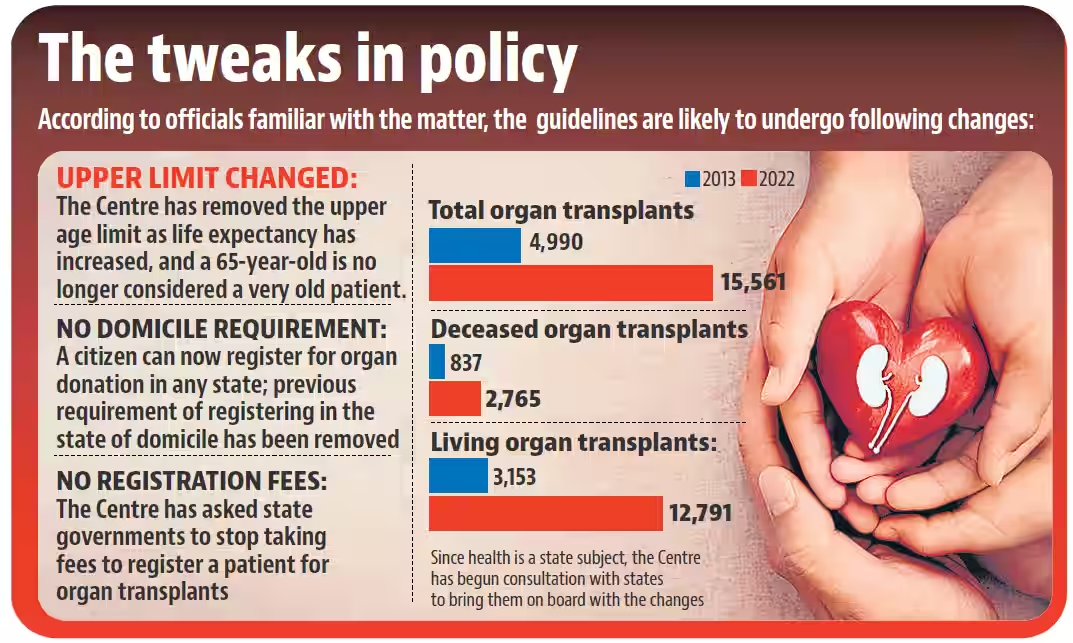Governance
National Organ Transplantation Guidelines
- 17 Feb 2023
- 5 min read
Prelims: National Organ Transplantation Guidelines, National Organ and Tissue Transplant Organization, Transplantation of Human Organs Act, 1994.
Mains: Need for Promoting Organ Donations.
Why in News?
Recently, the Ministry of Health and Family Welfare has modified National Organ Transplantation Guidelines, allowing those above 65 years of age to receive an organ for transplantation from deceased donors.
- In India, Transplantation of Human Organs Act, 1994 provides various regulations for the removal of human organs and its storage. It also regulates the transplantation of human organs for therapeutic purposes and for the prevention of commercial dealings in human organs.
What are the Highlights of the New Guidelines?
- Removed Age Cap:
- The upper age limit has been removed as people are now living longer.
- Earlier, according to the NOTTO (National Organ and Tissue Transplant Organization) guidelines, an end-stage organ failure patient above 65 years of age was prohibited from registering to receive the organ.
- The upper age limit has been removed as people are now living longer.
- No Domicile Requirement:
- The ministry has removed the domicile requirement to register as an organ recipient in a particular state under a ‘One Nation, One Policy’ move.
- Now a needy patient can register to receive an organ in any state of his or her choice and will also be able to get the surgery done there.
- No Fees for Registration:
- There will be no registration fee that states used to charge for this purpose, the Centre has asked states that used to charge for such registration to not do so.
- Among the states that sought money for registration were Gujarat, Telangana, Maharashtra, and Kerala.
- Certain states asked for anything between Rs 5,000 and Rs 10,000 to register a patient on the organ recipient waitlist.
Note
- NOTTO is set up under Directorate General of Health Services, Ministry of Health and Family Welfare, located in New Delhi.
- National Network division of NOTTO functions as apex centre for all India activities for procurement, distribution and registry of organs and tissues donation and transplantation in the country.
What is the Purpose of New Guidelines?
- The Centre is planning to make changes in the rules of Transplantation of Human Organs (Amendment) Act 2011 towards creating a national policy for transplantation.
- Currently, different states have different rules; the Union government is considering changes to the rules so that there is a standard criterion followed in all states across the country.
- However, Health being a state subject, the rules formed by the central government will not be binding on the states.
- The steps are aimed at better and more equitable access to organs and also to promote cadaver donations, which currently form a minuscule fraction of all organ transplants carried out in India.
What is the Scenario of Organ Transplantation in India?
- India conducts the third highest number of transplants in the world.
- Organs from deceased donors accounted for nearly 17.8% of all transplants in 2022.
- The total number of deceased organ transplants climbed from 837 in 2013 to 2,765 in 2022.
- The total number of organ transplants – with organs from both deceased and living donors – increased from 4,990 in 2013 to 15,561 in 2022.
- Every year, an estimated 1.5-2 lakh people need a kidney transplant.
- Only around 10,000 got one in 2022. Of the 80,000 people who required a liver transplant, less than 3,000 got one in 2022.
- And, of the 10,000 who needed a heart transplant, only 250 got it in 2022.
Way Forward
- Promoting Organ donations is an important initiative that can save lives and benefit society as a whole.
- By increasing awareness, educating the public, and improving the donation process, we can make organ and tissue donation more accessible and increase the number of potential donors.
- For increasing accessibility of donated organs to weaker sections, the public hospitals need to increase the infrastructural capacity to carry out transplantation and provide affordable proper treatment to the poor.
- It is suggested that cross-subsidization will increase accessibility to the weaker section. For every 3 or 4 transplants, the private hospitals should carry out free of cost transplantation to the section of the population that donates a majority of organs.







